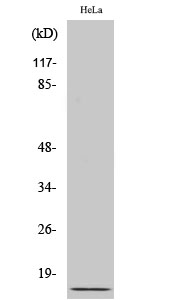
| WB | 咨询技术 | Human,Mouse,Rat |
| IF | 咨询技术 | Human,Mouse,Rat |
| IHC | 1/50-1/100 | Human,Mouse,Rat |
| ICC | 技术咨询 | Human,Mouse,Rat |
| FCM | 咨询技术 | Human,Mouse,Rat |
| Elisa | 1/10000 | Human,Mouse,Rat |
| Aliases | FLJ25987; MGC8385; ubiquitin B; Ubiquitin; UBCEP1; UBCEP2; RPS27A |
| Entrez GeneID | 7314/7316/6233/7311 |
| WB Predicted band size | Refer to figures |
| Host/Isotype | Rabbit IgG |
| Antibody Type | Primary antibody |
| Storage | Store at 4°C short term. Aliquot and store at -20°C long term. Avoid freeze/thaw cycles. |
| Species Reactivity | Human,Mouse,Rat |
| Immunogen | The antiserum was produced against synthesized peptide derived from human Ubiquitin. AA range:40-89 |
| Formulation | Purified antibody in PBS with 0.05% sodium azide,0.5%BSA and 50% glycerol. |
+ +
以下是3篇关于泛素抗体的经典文献,供参考:
---
1. **"Specific recognition of linear polyubiquitin by A20 zinc finger 7 is involved in NF-κB regulation"**
*作者:Kim HC, et al. (Nature, 2004)*
摘要:该研究报道了一种特异性识别K48连接型泛素链的单克隆抗体的开发,通过体外泛素链重构验证其结合特异性,并应用于检测细胞内蛋白酶体途径相关的多聚泛素化蛋白。
---
2. **"Ubiquitin chain editing revealed by polyubiquitin linkage-specific antibodies"**
*作者:Matsumoto ML, et al. (Cell, 2010)*
摘要:研究团队开发了针对K6、K11、K27等非经典泛素链连接类型的抗体,通过质谱和免疫印迹验证其特异性,揭示了泛素链编辑酶在DNA损伤修复中的作用。
---
3. **"Phosphorylation of ubiquitin at Ser65 regulates its polymerization"**
*作者:Newton K, et al. (EMBO J, 2008)*
摘要:首次报道了针对泛素丝氨酸65磷酸化修饰(pS65-Ub)的抗体,该抗体用于检测帕金森病相关激酶PINK1调控的线粒体自噬通路中的泛素磷酸化事件。
---
4. **"Methods to analyze ubiquitin conjugation and degradation"**
*作者:Yau RG, et al. (Methods Enzymol, 2019)*
摘要:综述类文献,系统总结了泛素抗体的选择策略(包括抗K63、M1连接型抗体),以及它们在免疫沉淀、免疫荧光等技术中检测蛋白质泛素化的实验方法优化。
---
这些文献覆盖了泛素抗体的开发、特异性验证及在关键生物学机制研究中的应用。如需具体实验细节或更近期研究,可进一步补充说明。
×